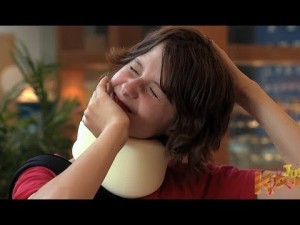Snap. Crackle. Pop.

Self -adjusting is as common in popular culture as it is in real life. How many movies have you seen where the main character twists his neck to the sound of smashing potato chips? For some, it ‘s a pain reliever. For others, it’s simply a habit. Regardless of why you do it, is it a good idea?
Moving two vertebrae that are “stuck” together is a good thing. When this movement occurs, the spine gains more mobility and often pressure is taken off of compressed nerves. Adjusting the spine also releases endorphins- those “feel good” hormones, which are released with exercise. However, manipulation of the spine incorrectly can also stretch ligaments and misalign vertebrae- just like whiplash.
Typical self-adjusters find themselves in the habit of adjusting and re-adjusting the spine. Improper manipulation of the spine is not specific, and leads to increased movement in overly mobile segments. In short, the stuck part stays stuck and the moveable parts become more moveable. This leads to hypermobility syndrome- basically self-inflicted whiplash. This can be very harmful, leading to a lifetime of pain and possibly irreversible damage. This person finds themselves adjusting their spine, feeling good for a short time due to released endorphins, and then readjusting the spine minutes or hours later.
Self-adjusting is a bad idea, and leads to chronic problems. The proper treatment is to stop self-adjusting, and receive a few precise chiropractic manipulations. When a chiropractor adjusts the spine, he/she does so after four years of schooling and practice. During this time there has been concentrated study on the motion occurring at individual spinal segments and careful study of spinal anatomy- both in textbooks and on cadavers. In short, your chiropractor is a spinal expert, and is the only one qualified to correctly treat the chronic self-adjuster. So, stop adjusting yourself, and go see your Longmont chiropractor!
Hypermobility syndrome:
http://www.newhealthguide.org/Is-Cracking-Your-Back-Bad.html
endorphins and manipulation: http://www.ncbi.nlm.nih.gov/pubmed/2942618
